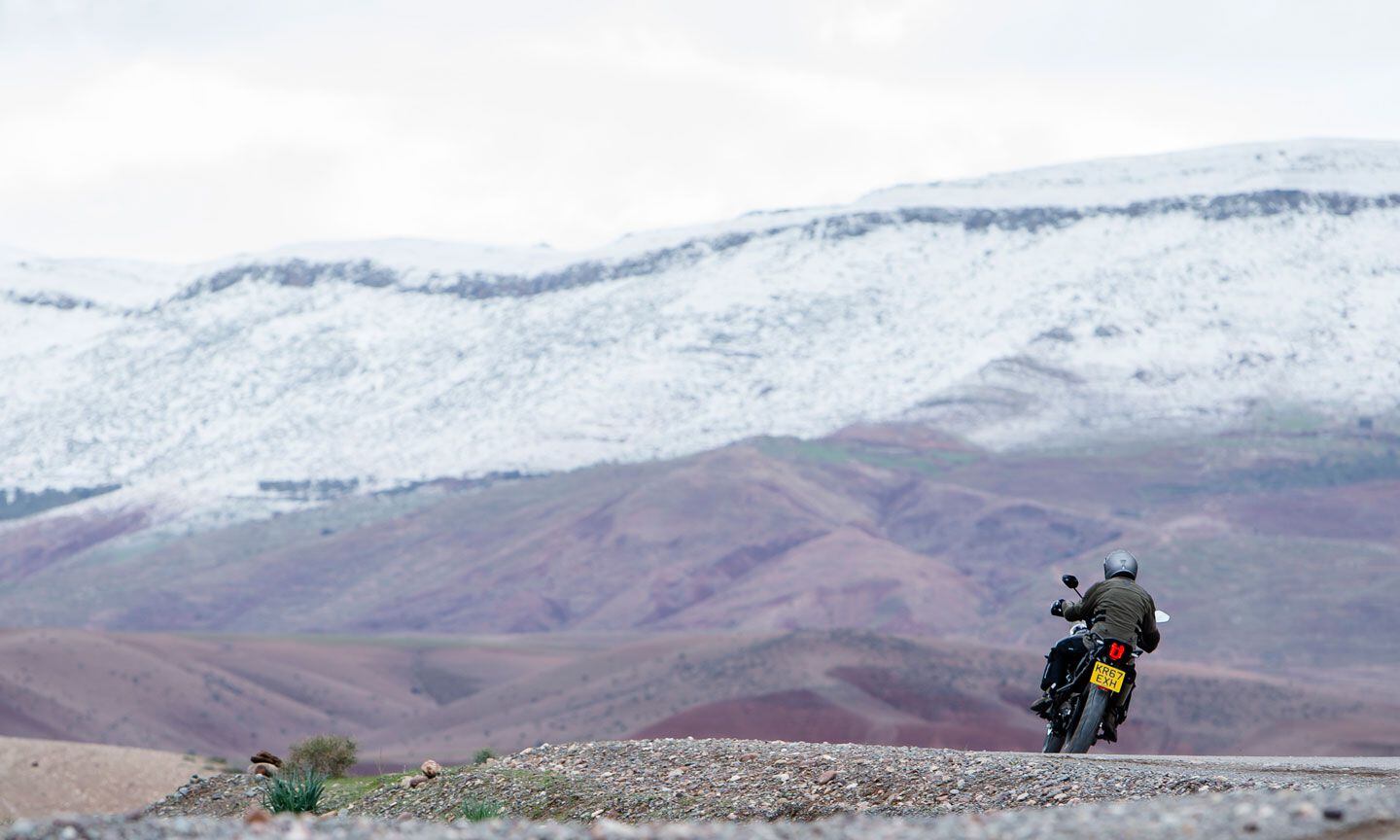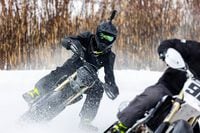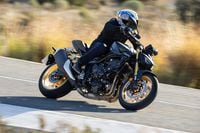F
orty-eight hours is too little time to spend in a land brimming with mystery and inhabited by such a fine, handsome people. I came to test Triumph’s new Tiger 800. On the Tiger, traversing rolling fields of a newly germinating spring crop, I absorb the sights and sounds, hoping to record them in my mind. Any account of Morocco I give is with the knowledge that it is really more an account of myself and a reflection of my own mood and temperament at the time. I can be a witness to a place and observe its customs (albeit briefly, in this case), but I can no more impartially interpret them than I can forget my first motorcycle ride or figure out how to, say, properly throw a football (picture Woody Allen playing Jenga without his glasses and wearing mittens, and you’ll begin to sense my struggle). Indeed, trying to fit in with my wife’s athletic brothers can be humbling: “You guys have fun with the pigskin, I’ll just be inside playing My Little Pony with the five-year-old girls.” But I digress… Steinbeck says of the traveler: “Our morning eyes describe a different world than do our afternoon eyes, and surely our wearied evening eyes can only report a weary evening world.” After 36 hours of sleepless travel, getting hassled by suspicious Moroccan customs agents (in my desperation I wanted to yell, “I’m an American, dammit!”), and hours of clutching my empty, growling stomach, I’d say my eyes were exhausted, entitled, and irritable. It’s amazing, then, that I can describe Morocco as a place of wonder. My group of North American journalists arrived at a tenting compound outside of Tamazirt, 50 clicks south of Marrakesh. It was 40 degrees and the mountains were covered in snow.
Shivering more from nerves and anticipation than from the cold, I set off on a new Tiger 800, its street tires sliding through the red, wet clay before turning onto tarmac. Not 10 minutes into the ride, we stopped for the first photo opportunity and Alex, one of Triumph's Spanish development riders, yelled past my helmet, "Go slow. We already had a crash. He dumped the bike in a ditch when a truck forced him off the road."
The roads in these parts of the Atlas Mountains are narrow, their broken pavement blending at the edges into gravel and mud. The best road surfaces were littered with potholes and gravel tossed from passing cars. Some roads were missing sections, flooded because of last night’s rain, or precariously wound atop cliffs and steep ravines. The Tiger 800 was in its element.
Higher into the mountains, the roads were covered in slush and the landscape became more desolate against a gray sky and the falling hail. At points, there were no signs of civilization. Yet there’d be an old man dressed in a djellaba, the traditional hooded woolen cloak, sitting on a rock as if he were expecting our caravan of motorcycles. Mountain villages looked untouched by time. Squat square houses huddled around each other and swarms of children ran in the streets. The air was pungent with the smell of diesel fumes and wood smoke.
I was snug on my heated saddle, grasping heated bars. Children were in flip-flops, tossing snowballs with bare hands as we passed. Goat herders—as though ripped from the pages of Arabian Nights—walked with their hands behind their backs, solemnly watching their flocks and fiddling with grass switches to keep their fingers nimble in the cold.
In the markets of Marrakesh, vendors were selling selfie sticks to tourists, but here, globalism’s clutch seemed looser. I’m reluctant to indulge in romantic visions of simpler times, or decry the inevitable homogenizing force of progress—of sanitized fast food joints, smooth highways carved in flattened mountains, or of foreign tongues shaped around a Justin Bieber song. When a dozen teenage boys gathered to gawk at the edge of our covey of Tigers, I doubt they’d view progress with the same disdain as does the average American spoiled by his own expectations. To these Berber kids, such a motorcycle represents their fervent hopes and wildest dreams.
Whenever we’d pull over, people wandered over to hawk trinkets—fossils from Egypt of dubious authenticity, metal bracelets, and long colorful necklaces. Or they’d approach smiling and curious.
“Where are you from? American? English? My name is Khaled, what is your name?”
To me, they were the best ambassadors of their country. They were courteous and unfailingly cheerful. There were people everywhere: Children walking home from school in laughing masses, farmers crowding a tractor’s cab, women in hijabs carrying groceries from the corner store. What does loneliness look like in the Atlas Mountains? I imagine even the solitary shepherd returns home to greet three generations of his family.
For all our progress, we are more isolated than the people of these distant hills. It’s easy to travel all the way to Morocco without speaking a single word to anyone except flight attendants and the cashier at Hudson News. In these parts of Morocco, conversation is as inevitable as a stray dog running across the road.
In two days, I would not have encountered this world had I not been on the seat of a motorcycle. In a car, a stranger would not come up to me and place his hand on my arm as he spoke. I would have been anonymous. Just another tourist looking for cheap wisdom. Had I been walking, experiencing the world as it met my feet, my conversations may have been more profound, but I wouldn’t have seen very much. Only the motorcyclist, more vulnerable and public than most travelers, can be a party to so much in so little time. From the luxury of my heated saddle, I see a world not my own. I see myself in the face of the wizened shepherd. It’s good to breathe his air. It’s a fine day to ride a Triumph in Morocco.












/cloudfront-us-east-1.images.arcpublishing.com/octane/PDM36SISNC6N54J2D22NI6T5HU.jpg)
/cloudfront-us-east-1.images.arcpublishing.com/octane/WJN4UU6W63QJQABXKJK7U7UOS4.jpg)
/cloudfront-us-east-1.images.arcpublishing.com/octane/2WF3SCE3NFBQXLDNJM7KMXA45E.jpg)
/cloudfront-us-east-1.images.arcpublishing.com/octane/G4MG6OUCJNBSHIS2MVVOTPX65E.jpg)
/cloudfront-us-east-1.images.arcpublishing.com/octane/IIGGWFOTOJGB7DB6DGBXCCMTDY.jpg)
/cloudfront-us-east-1.images.arcpublishing.com/octane/QSTCM6AVEZA5JJBUXNIQ3DSOF4.jpg)
/cloudfront-us-east-1.images.arcpublishing.com/octane/U4I7G625B5DMLF2DVIJDFZVV6M.jpg)
/cloudfront-us-east-1.images.arcpublishing.com/octane/B6XD6LS6IVCQPIU6HXDJSM3FHY.jpg)
/cloudfront-us-east-1.images.arcpublishing.com/octane/ICL63FEDDRDTTMINYICCEYGMDA.jpg)
/cloudfront-us-east-1.images.arcpublishing.com/octane/FCGZHQXRBZFLBAPC5SDIQLVF4I.jpg)
/cloudfront-us-east-1.images.arcpublishing.com/octane/WNOB6LDOIFFHJKPSVIWDYUGOPM.jpg)

/cloudfront-us-east-1.images.arcpublishing.com/octane/X33NU3E525ECRHXLNUJN2FTRKI.jpg)
/cloudfront-us-east-1.images.arcpublishing.com/octane/6KKT5NNL2JAVBOXMZYS5ZO76YA.jpg)
/cloudfront-us-east-1.images.arcpublishing.com/octane/J5RKG5O455GMPGQRF2OG6LRT7A.jpg)
/cloudfront-us-east-1.images.arcpublishing.com/octane/GX2CIZKQVRH2TATDM26KFG2DAE.jpg)
/cloudfront-us-east-1.images.arcpublishing.com/octane/ZWIDYSAKQZHD5BHREMQILXJCGM.jpg)
/cloudfront-us-east-1.images.arcpublishing.com/octane/CYUHJZCTSJCH3MRAQEIKXK7SCQ.jpg)
/cloudfront-us-east-1.images.arcpublishing.com/octane/LKOFINY56FCXJCANJ5M7ZDQUBY.jpg)
/cloudfront-us-east-1.images.arcpublishing.com/octane/4NBPDACMWJH63JQYJVK3QRBDZI.jpg)
/cloudfront-us-east-1.images.arcpublishing.com/octane/KKHQHRR3FJGX7H2IPU6RALMWG4.jpg)

/cloudfront-us-east-1.images.arcpublishing.com/octane/5IOFS5JAE5FOXMNA23ZRAVVYUU.jpg)
/cloudfront-us-east-1.images.arcpublishing.com/octane/CGXQ3O2VVJF7PGTYR3QICTLDLM.jpg)

/cloudfront-us-east-1.images.arcpublishing.com/octane/OQVCJOABCFC5NBEF2KIGRCV3XA.jpg)